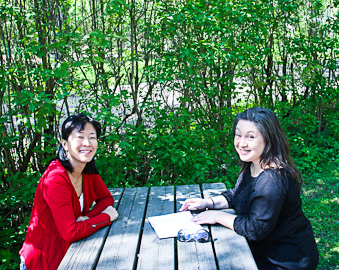Course on Advanced Research Japanese to Meet the Increasing Demand
The Centre for East Asian Studies (CEAS) will arrange a new Advanced Research Japanese course with the help of a grant from the Japan Foundation. The course will introduce the students to conducting fieldwork and reading primary sources in Japanese.

University Teachers Kanako Kuramitsu and Annamari Konttinen are pleased that CEAS is now able to offer a Japanese language course tailored for the centre’s own students and their research purposes.
Starting in September, the new course complements the low-intermediate, intermediate and advanced language levels with advanced research Japanese, which is the first of its kind in Finland.
University Teacher Annamari Konttinen is excited that the centre is now able to provide full professional Japanese language skills for the most advanced degree students, doctoral students and researchers.
– The new course is useful even for native speakers of Japanese, as the academic writing conventions differ from everyday language. Thus, the level of the course is comparable to courses of academic writing in Finnish and English at our university, Konttinen says.
Before CEAS answered the increasing demand, it was possible to study Japanese only at the Language Centre, and business Japanese at Turku School of Economics.
Due to cooperation with the Confucius Institute at the University of Helsinki, students can acquire the same level also in Chinese.
CEAS is the main leading research centre focusing on contemporary East Asia in Finland, and one of the most significant in the Nordic countries.
Konttinen is pleased that the centre has been able to establish a well-functioning system, one proof being that last year, as many as 15 Masters graduated from the programme.
Even though the centre has been highly successful, the operations could always be improved.
– At the moment, the distinction between the basic and intermediate level language courses is too strict, we should have more low-intermediate teaching available, Konttinen states.
Primary Source Reading and Fieldwork
Originally from the Kanagawa Prefecture in Japan, Kanako Kuramitsu is the teacher of the new course.
Kuramitsu taught Japanese in China for four years before coming to Turku to study at the East Asian Studies Master’s degree programme, from which she graduated last autumn.
The contact-based course aims to provide students with language skills needed to read primary sources and to conduct their fieldwork projects in Japan using Japanese as their working language.
During the course, academic texts as well as media texts will be studied, and the reading will be based on the students' fields of research.
The course also develops the students’ writing conventions of different academic and formal genres of texts, as well as skills required for correspondence and writing of applications.
In addition, the course will emphasise pragmatic skills such as conducting searches in different academic and media databases, as well as assessing materials.
Different Linguistic Backgrounds
The challenges of the course include the fact that the students at CEAS come from very different linguistic backgrounds, their level of Japanese skills varies, and they have different research interests.
Therefore, the course will be tailored to the students’ interests, and also individual sessions will be provided to ensure that everyone’s needs will be met.
– As a teacher, I try to give students more opportunities to speak in class, as you can practice reading on your own, she says.
Rather surprisingly, Kuramitsu has found that students at the intermediate level are often the most hesitant to ask questions.
– I believe this is due to the fact that at the beginning, everyone is at the same level, but at the intermediate level, the level varies more, she says.
Kuramitsu is delighted that students are usually highly enthusiastic about some aspect of Japan or the Japanese culture, which makes them motivated and the language easier to learn.
– Hopefully, I will be able to keep the atmosphere relaxed so that everyone feels free to ask whatever they have in mind. I am sure that every question will benefit other students too, Kuramitsu states.
The web pages of the Centre for East Asian Studies: http://www.utu.fi/en/units/soc/units/ceas/Pages/home.aspx
Text: Aura Jaakkola
Photos: Reynard Karman, Aura Jaakkola